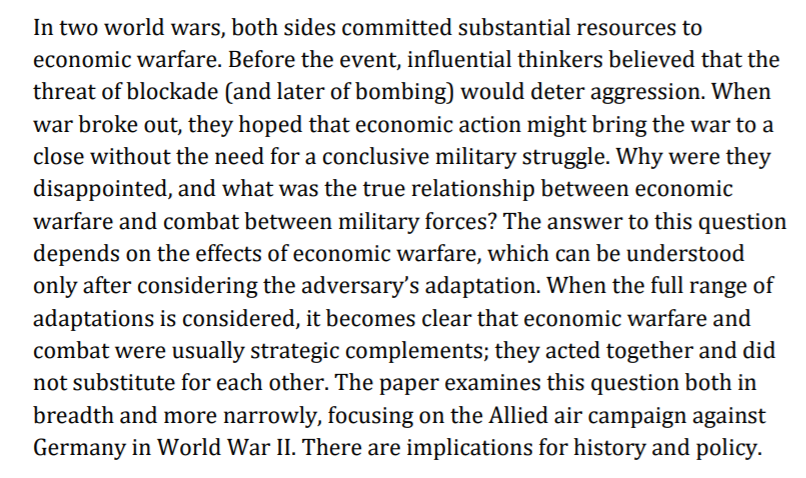Eighty years ago, it was the winter of 1940. Already terrible, #WW2 was coiled like a spring. It would shortly transform into something far worse. Fifty million people had yet to die 1/7
In the winter of 1940, Mussolini was dreaming of Greece, Hitler was eyeing Ukraine, Yamamoto was contemplating Pearl Harbor. The decisions they made would widen the war into Africa, Eurasia, and the Pacific and lead eventually to their own destruction 2/7
The dictators gambled everything on the offensive. They forced the rest of the world to throw everything into resistance. They underestimated the power of economics. The price was terrible 3/7
The Allies were not bound to win; stalemate and even defeat remained possible up to the end of 1942. But economics contributes *a lot* to explaining how they did win in the end 4/7
For your #ArmisticeDay  and #VeteransDay reading, the best of recent research on The Economics of the Second World War, a free @cepr_org eBook, is here https://voxeu.org/content/new-ebook-economics-second-world-war-seventy-five-years edited by Broadberry and me 5/7
and #VeteransDay reading, the best of recent research on The Economics of the Second World War, a free @cepr_org eBook, is here https://voxeu.org/content/new-ebook-economics-second-world-war-seventy-five-years edited by Broadberry and me 5/7
 and #VeteransDay reading, the best of recent research on The Economics of the Second World War, a free @cepr_org eBook, is here https://voxeu.org/content/new-ebook-economics-second-world-war-seventy-five-years edited by Broadberry and me 5/7
and #VeteransDay reading, the best of recent research on The Economics of the Second World War, a free @cepr_org eBook, is here https://voxeu.org/content/new-ebook-economics-second-world-war-seventy-five-years edited by Broadberry and me 5/7
Chapters on war preparations by Voth Overy Broadberry and me; on conduct of the war by @PhillipsPOBrien @DEHEdgerton Fishback Okazaki Klemann me Golson and Bollard; on consequences of the war by O Grada @WalterScheidel Vonyo and Grosjean 6/7
To which I'll add my recent essay on Economic Warfare in Twentieth Century History and Strategy, a @cage_warwick working paper https://warwick.ac.uk/fac/soc/economics/research/centres/cage/manage/publications/wp468.2020.pdf 7/7
Oh, wait . . .FAO @cepr_org @voxeu @BritishAcademy_ @ehs @BASEES @SWWresearch @cage_warwick @warwickecon @warwicknewsroom /end

 Read on Twitter
Read on Twitter


